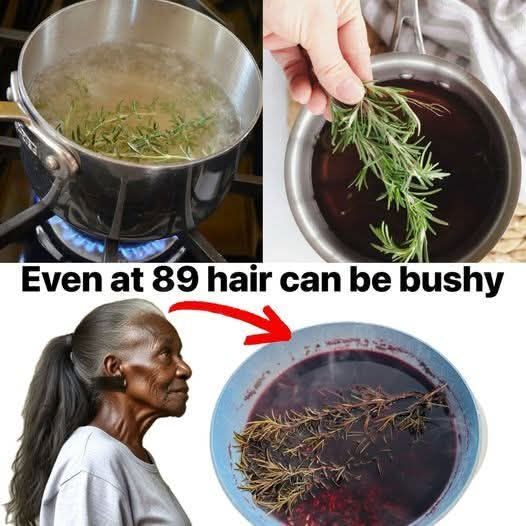Grandma’s Secret: Boiling Rosemary for Thick, Lush Hair
Introduction
For generations, rosemary has been treasured as a natural remedy for enhancing hair growth and improving hair health.
Its potent properties, derived from antioxidants and essential nutrients, make it a powerful yet gentle solution for thinning hair and scalp issues.
The ritual of boiling rosemary for hair care is deeply rooted in traditional practices, passed down by grandmothers who understood the value of nature’s gifts.
This simple, all-natural method not only promotes thicker, stronger hair but also soothes the scalp and adds a healthy shine.
Ingredients
1 handful of fresh or dried rosemary sprigs
4 cups of water
Optional: a few drops of essential oils (lavender or peppermint for added benefits)
A spray bottle or container for storage
Instructions
Start by gathering your ingredients. Fresh rosemary sprigs work best, but dried rosemary is a great alternative if fresh is unavailable. Ensure the rosemary is clean and free of dirt.
Bring a pot of water to a boil. Use about four cups of water, depending on how concentrated you’d like your rosemary rinse to be.
Add the rosemary to the boiling water. Reduce the heat to a simmer and let it steep for about 15 to 20 minutes. This allows the beneficial compounds to infuse into the water.
Remove the pot from the heat and let the rosemary water cool completely. Straining the liquid to remove the sprigs ensures a smooth rinse.
Transfer the cooled rosemary water to a spray bottle or any container for easy application.
Adding a few drops of essential oils, such as lavender or peppermint, can enhance the fragrance and benefits.
Wash your hair as usual with a gentle shampoo, then apply the rosemary rinse. Pour or spray it evenly over your scalp and hair, focusing on the roots.
Allow the rinse to sit for a few minutes before rinsing with plain water, or leave it in for a more intensive treatment. Repeat the process two to three times a week for the best results.
How to Make
Boiling rosemary begins with choosing quality sprigs. Fresh rosemary offers the most potency, but dried rosemary provides a concentrated infusion if stored properly.
Clean the rosemary thoroughly under cool water to remove dirt or impurities. This ensures the infusion is pure and safe for application.
Use a stainless steel or non-reactive pot to boil the water. This helps preserve the essential oils and nutrients in the rosemary during the steeping process.
Steeping the rosemary for 15 to 20 minutes allows the water to absorb its natural oils and nutrients fully. For a stronger solution, let it steep longer or use more rosemary.
Strain the rosemary water using a fine mesh sieve or cheesecloth. This removes any residue, ensuring a smooth application that won’t leave particles in your hair.
Allow the rosemary rinse to cool completely before transferring it to a container. Heat can damage plastic bottles, so glass containers are a safer choice if storing for extended periods.
For added benefits, enhance your rosemary rinse with natural ingredients like aloe vera, apple cider vinegar, or a few drops of argan oil to address specific hair concerns.
Tips
Consistency is key to seeing results. Use the rosemary rinse two to three times a week to encourage noticeable hair growth and strength over time.
Massage your scalp while applying the rinse. This boosts blood circulation, helping the rosemary’s nutrients penetrate the hair follicles more effectively.
Avoid rinsing the rosemary solution out too quickly. Letting it sit for a few minutes allows your hair and scalp to absorb its full benefits.
If you have blonde or light-colored hair, test the rinse on a small section first. Rosemary may slightly darken hair over time with frequent use.
Store the rosemary rinse in the refrigerator for up to a week. Discard any leftover solution if it develops an off smell or appearance.
Enhance the experience by adding a relaxing essential oil like lavender or invigorating peppermint to your rinse. These oils complement rosemary’s benefits and create a spa-like feel.
Pair the rosemary rinse with a balanced diet and a good hair care routine for optimal results. Hydration, scalp health, and nutrient-rich foods all play a role in achieving thicker, healthier hair.
Conclusion
Boiling rosemary is a timeless remedy that connects us to natural solutions for hair care. Its ability to nourish the scalp.
stimulate growth, and add shine makes it an invaluable part of any hair care routine.
The simplicity of this treatment ensures it’s accessible to everyone, whether you’re dealing with hair thinning or simply want to maintain healthy locks.
By incorporating this rinse into your routine, you can enjoy stronger, more vibrant hair with minimal effort.
Grandmothers have long relied on this remedy for a reason—it works. Modern research even supports rosemary’s efficacy in promoting hair growth and improving scalp health, validating these traditional practices.
Unlike chemical-laden hair produts, rosemary water is gentle, natural, and free of harmful additives, making it a safe choice for all hair types.
Embrace the power of this herbal remedy and enjoy the confidence that comes with thick, lush hair. With consistency and care, the benefits of rosemary will speak for themselves.
